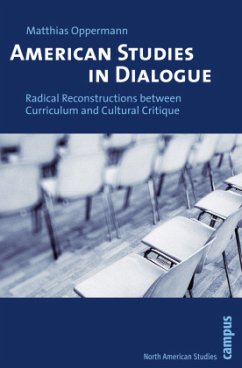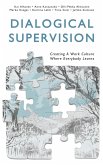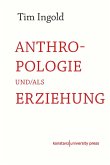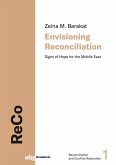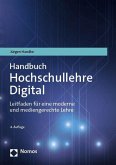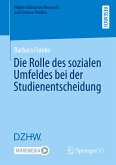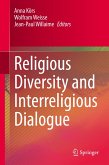Matthias Oppermann
American Studies in Dialogue
Radical Reconstructions between Curriculum and Cultural Critique
Matthias Oppermann
American Studies in Dialogue
Radical Reconstructions between Curriculum and Cultural Critique
- Broschiertes Buch
- Merkliste
- Auf die Merkliste
- Bewerten Bewerten
- Teilen
- Produkt teilen
- Produkterinnerung
- Produkterinnerung
Seit seiner Entstehung in den 1930er- Jahren hat sich das Fach "American Studies" in den USA radikal verändert. Als Motor dieses Prozesses galt bislang die wissenschaftliche Forschung. Matthias Oppermann beleuchtet nun erstmals die Rolle der Lehre und zeigt, dass das Fach von Beginn an durch Kurse und Lehrpläne nicht nur didaktisch, sondern auch theoretisch kontinuierlich neu konstituiert wurde. Mit dieser Neubewertung liefert er ein revidiertes Verständnis der "American Studies" als interdisziplinäre Kulturwissenschaft im Spannungsfeld unterschiedlicher Theorien, Methoden und Forschungsgegenstände.…mehr
Andere Kunden interessierten sich auch für
![Dialogical Supervision Dialogical Supervision]() Kai AlhanenDialogical Supervision21,99 €
Kai AlhanenDialogical Supervision21,99 €![Anthropologie und/als Erziehung Anthropologie und/als Erziehung]() Tim IngoldAnthropologie und/als Erziehung24,00 €
Tim IngoldAnthropologie und/als Erziehung24,00 €![Envisioning Reconciliation Envisioning Reconciliation]() Zeina BarakatEnvisioning Reconciliation38,00 €
Zeina BarakatEnvisioning Reconciliation38,00 €![Wissen und Begründen Wissen und Begründen]() Wissen und Begründen39,00 €
Wissen und Begründen39,00 €![Handbuch Hochschullehre Digital Handbuch Hochschullehre Digital]() Jürgen HandkeHandbuch Hochschullehre Digital39,00 €
Jürgen HandkeHandbuch Hochschullehre Digital39,00 €![Die Rolle des sozialen Umfeldes bei der Studienentscheidung Die Rolle des sozialen Umfeldes bei der Studienentscheidung]() Barbara FrankeDie Rolle des sozialen Umfeldes bei der Studienentscheidung64,99 €
Barbara FrankeDie Rolle des sozialen Umfeldes bei der Studienentscheidung64,99 €![Religious Diversity and Interreligious Dialogue Religious Diversity and Interreligious Dialogue]() Religious Diversity and Interreligious Dialogue106,99 €
Religious Diversity and Interreligious Dialogue106,99 €-
-
-
Seit seiner Entstehung in den 1930er- Jahren hat sich das Fach "American Studies" in den USA radikal verändert. Als Motor dieses Prozesses galt bislang die wissenschaftliche Forschung. Matthias Oppermann beleuchtet nun erstmals die Rolle der Lehre und zeigt, dass das Fach von Beginn an durch Kurse und Lehrpläne nicht nur didaktisch, sondern auch theoretisch kontinuierlich neu konstituiert wurde. Mit dieser Neubewertung liefert er ein revidiertes Verständnis der "American Studies" als interdisziplinäre Kulturwissenschaft im Spannungsfeld unterschiedlicher Theorien, Methoden und Forschungsgegenstände.
Produktdetails
- Produktdetails
- Nordamerikastudien 29
- Verlag: Campus Verlag / University of Chicago Press
- Artikelnr. des Verlages: 39317
- Seitenzahl: 297
- Erscheinungstermin: Oktober 2010
- Englisch
- Abmessung: 213mm x 141mm x 22mm
- Gewicht: 372g
- ISBN-13: 9783593393179
- ISBN-10: 3593393174
- Artikelnr.: 30084728
- Herstellerkennzeichnung Die Herstellerinformationen sind derzeit nicht verfügbar.
- Nordamerikastudien 29
- Verlag: Campus Verlag / University of Chicago Press
- Artikelnr. des Verlages: 39317
- Seitenzahl: 297
- Erscheinungstermin: Oktober 2010
- Englisch
- Abmessung: 213mm x 141mm x 22mm
- Gewicht: 372g
- ISBN-13: 9783593393179
- ISBN-10: 3593393174
- Artikelnr.: 30084728
- Herstellerkennzeichnung Die Herstellerinformationen sind derzeit nicht verfügbar.
Table of ContentsAcknowledgmentsixIntroduction12Histories of Curricular Innovation1. American Studies as Curricular Innovation: Interventions into Narratives of Field Formation351.1 "A Subject So Familiar and So Simple": American Literature and American Civilization in the College Curriculum381.2 Money, Jingoism, and Folklore? American Studies after World War II551.3 Bridging the Schisms of Culture and Method: "Peaux Rouges" and "Mandarins" in Minnesota752. Maturity and Midlife Crises: Radical Teachers, Cultural Turns862.1 Quantitative Growth and Organizational Structures in the 1960s and 1970s882.2 Cultural Experts and Literary Amateurs in the Early 1960s 942.3 Radical Teaching Contra Cultural Consensus?1002.4 Collaborators, Computers, Problem-Solvers: Minnesota, Pennsylvania, and Davis (Re-)Considered107Trajectories of Transformation3. Multiculturalism as Radical Critique: American Studies Beyond the Nation1313.1 Social Movements, European Theory, and the Search for Resistance1343.2 Contextualizing Cultural Studies: The Political Work of Cultural Critique1403.3 Dialogics Beyond Borders: American Culture Studies1463.4 From Coverage to Contact Zones: Curricula of Comparative U.S. Cultures1524. American Studies in the Age of Digital Cultures1654.1 American Studies and New Media1664.2 Culture and Database: George Allen's Curse, Chris Crocker's Cupcake1714.3 New Media-New American Studies?179Expansions of the Field-Imaginary5. American Studies and the Learning Paradigm1875.1 Understanding Student Learning1935.2 Novice, Expert, and Beyond2035.3 Does American Studies Have "Signature Pedagogies"?2146. From Best Practices to Next Practices2266.1 Going Meta: Towards a Scholarship of Teaching in American Studies2276.2 Pedagogies and Epistemologies: Notes from the Visible Knowledge Project2346.3 Digital Storytelling: Adaptive, Embodied, and Socially Situated245Epilogue266List of Tables273Bibliography274Index292Table of Contents
Acknowledgmentsix
Introduction12
Histories of Curricular Innovation
1. American Studies as Curricular Innovation: Interventions into Narratives of Field Formation35
1.1 "A Subject So Familiar and So Simple": American Literature and American Civilization in the College Curriculum38
1.2 Money, Jingoism, and Folklore? American Studies after World War II55
1.3 Bridging the Schisms of Culture and Method: "Peaux Rouges" and "Mandarins" in Minnesota75
2. Maturity and Midlife Crises: Radical Teachers, Cultural Turns86
2.1 Quantitative Growth and Organizational Structures in the 1960s and 1970s88
2.2 Cultural Experts and Literary Amateurs in the Early 1960s 94
2.3 Radical Teaching Contra Cultural Consensus?100
2.4 Collaborators, Computers, Problem-Solvers: Minnesota, Pennsylvania, and Davis (Re-)Considered107
Trajectories of Transformation
3. Multiculturalism as Radical Critique: American Studies Beyond the Nation131
3.1 Social Movements, European Theory, and the Search for Resistance134
3.2 Contextualizing Cultural Studies: The Political Work of Cultural Critique140
3.3 Dialogics Beyond Borders: American Culture Studies146
3.4 From Coverage to Contact Zones: Curricula of Comparative U.S. Cultures152
4. American Studies in the Age of Digital Cultures165
4.1 American Studies and New Media166
4.2 Culture and Database: George Allen's Curse, Chris Crocker's Cupcake171
4.3 New Media-New American Studies?179
Expansions of the Field-Imaginary
5. American Studies and the Learning Paradigm187
5.1 Understanding Student Learning193
5.2 Novice, Expert, and Beyond203
5.3 Does American Studies Have "Signature Pedagogies"?214
6. From Best Practices to Next Practices226
6.1 Going Meta: Towards a Scholarship of Teaching in American Studies227
6.2 Pedagogies and Epistemologies: Notes from the Visible Knowledge Project234
6.3 Digital Storytelling: Adaptive, Embodied, and Socially Situated245
Epilogue266
List of Tables273
Bibliography274
Index292
Acknowledgmentsix
Introduction12
Histories of Curricular Innovation
1. American Studies as Curricular Innovation: Interventions into Narratives of Field Formation35
1.1 "A Subject So Familiar and So Simple": American Literature and American Civilization in the College Curriculum38
1.2 Money, Jingoism, and Folklore? American Studies after World War II55
1.3 Bridging the Schisms of Culture and Method: "Peaux Rouges" and "Mandarins" in Minnesota75
2. Maturity and Midlife Crises: Radical Teachers, Cultural Turns86
2.1 Quantitative Growth and Organizational Structures in the 1960s and 1970s88
2.2 Cultural Experts and Literary Amateurs in the Early 1960s 94
2.3 Radical Teaching Contra Cultural Consensus?100
2.4 Collaborators, Computers, Problem-Solvers: Minnesota, Pennsylvania, and Davis (Re-)Considered107
Trajectories of Transformation
3. Multiculturalism as Radical Critique: American Studies Beyond the Nation131
3.1 Social Movements, European Theory, and the Search for Resistance134
3.2 Contextualizing Cultural Studies: The Political Work of Cultural Critique140
3.3 Dialogics Beyond Borders: American Culture Studies146
3.4 From Coverage to Contact Zones: Curricula of Comparative U.S. Cultures152
4. American Studies in the Age of Digital Cultures165
4.1 American Studies and New Media166
4.2 Culture and Database: George Allen's Curse, Chris Crocker's Cupcake171
4.3 New Media-New American Studies?179
Expansions of the Field-Imaginary
5. American Studies and the Learning Paradigm187
5.1 Understanding Student Learning193
5.2 Novice, Expert, and Beyond203
5.3 Does American Studies Have "Signature Pedagogies"?214
6. From Best Practices to Next Practices226
6.1 Going Meta: Towards a Scholarship of Teaching in American Studies227
6.2 Pedagogies and Epistemologies: Notes from the Visible Knowledge Project234
6.3 Digital Storytelling: Adaptive, Embodied, and Socially Situated245
Epilogue266
List of Tables273
Bibliography274
Index292
Table of ContentsAcknowledgmentsixIntroduction12Histories of Curricular Innovation1. American Studies as Curricular Innovation: Interventions into Narratives of Field Formation351.1 "A Subject So Familiar and So Simple": American Literature and American Civilization in the College Curriculum381.2 Money, Jingoism, and Folklore? American Studies after World War II551.3 Bridging the Schisms of Culture and Method: "Peaux Rouges" and "Mandarins" in Minnesota752. Maturity and Midlife Crises: Radical Teachers, Cultural Turns862.1 Quantitative Growth and Organizational Structures in the 1960s and 1970s882.2 Cultural Experts and Literary Amateurs in the Early 1960s 942.3 Radical Teaching Contra Cultural Consensus?1002.4 Collaborators, Computers, Problem-Solvers: Minnesota, Pennsylvania, and Davis (Re-)Considered107Trajectories of Transformation3. Multiculturalism as Radical Critique: American Studies Beyond the Nation1313.1 Social Movements, European Theory, and the Search for Resistance1343.2 Contextualizing Cultural Studies: The Political Work of Cultural Critique1403.3 Dialogics Beyond Borders: American Culture Studies1463.4 From Coverage to Contact Zones: Curricula of Comparative U.S. Cultures1524. American Studies in the Age of Digital Cultures1654.1 American Studies and New Media1664.2 Culture and Database: George Allen's Curse, Chris Crocker's Cupcake1714.3 New Media-New American Studies?179Expansions of the Field-Imaginary5. American Studies and the Learning Paradigm1875.1 Understanding Student Learning1935.2 Novice, Expert, and Beyond2035.3 Does American Studies Have "Signature Pedagogies"?2146. From Best Practices to Next Practices2266.1 Going Meta: Towards a Scholarship of Teaching in American Studies2276.2 Pedagogies and Epistemologies: Notes from the Visible Knowledge Project2346.3 Digital Storytelling: Adaptive, Embodied, and Socially Situated245Epilogue266List of Tables273Bibliography274Index292Table of Contents
Acknowledgmentsix
Introduction12
Histories of Curricular Innovation
1. American Studies as Curricular Innovation: Interventions into Narratives of Field Formation35
1.1 "A Subject So Familiar and So Simple": American Literature and American Civilization in the College Curriculum38
1.2 Money, Jingoism, and Folklore? American Studies after World War II55
1.3 Bridging the Schisms of Culture and Method: "Peaux Rouges" and "Mandarins" in Minnesota75
2. Maturity and Midlife Crises: Radical Teachers, Cultural Turns86
2.1 Quantitative Growth and Organizational Structures in the 1960s and 1970s88
2.2 Cultural Experts and Literary Amateurs in the Early 1960s 94
2.3 Radical Teaching Contra Cultural Consensus?100
2.4 Collaborators, Computers, Problem-Solvers: Minnesota, Pennsylvania, and Davis (Re-)Considered107
Trajectories of Transformation
3. Multiculturalism as Radical Critique: American Studies Beyond the Nation131
3.1 Social Movements, European Theory, and the Search for Resistance134
3.2 Contextualizing Cultural Studies: The Political Work of Cultural Critique140
3.3 Dialogics Beyond Borders: American Culture Studies146
3.4 From Coverage to Contact Zones: Curricula of Comparative U.S. Cultures152
4. American Studies in the Age of Digital Cultures165
4.1 American Studies and New Media166
4.2 Culture and Database: George Allen's Curse, Chris Crocker's Cupcake171
4.3 New Media-New American Studies?179
Expansions of the Field-Imaginary
5. American Studies and the Learning Paradigm187
5.1 Understanding Student Learning193
5.2 Novice, Expert, and Beyond203
5.3 Does American Studies Have "Signature Pedagogies"?214
6. From Best Practices to Next Practices226
6.1 Going Meta: Towards a Scholarship of Teaching in American Studies227
6.2 Pedagogies and Epistemologies: Notes from the Visible Knowledge Project234
6.3 Digital Storytelling: Adaptive, Embodied, and Socially Situated245
Epilogue266
List of Tables273
Bibliography274
Index292
Acknowledgmentsix
Introduction12
Histories of Curricular Innovation
1. American Studies as Curricular Innovation: Interventions into Narratives of Field Formation35
1.1 "A Subject So Familiar and So Simple": American Literature and American Civilization in the College Curriculum38
1.2 Money, Jingoism, and Folklore? American Studies after World War II55
1.3 Bridging the Schisms of Culture and Method: "Peaux Rouges" and "Mandarins" in Minnesota75
2. Maturity and Midlife Crises: Radical Teachers, Cultural Turns86
2.1 Quantitative Growth and Organizational Structures in the 1960s and 1970s88
2.2 Cultural Experts and Literary Amateurs in the Early 1960s 94
2.3 Radical Teaching Contra Cultural Consensus?100
2.4 Collaborators, Computers, Problem-Solvers: Minnesota, Pennsylvania, and Davis (Re-)Considered107
Trajectories of Transformation
3. Multiculturalism as Radical Critique: American Studies Beyond the Nation131
3.1 Social Movements, European Theory, and the Search for Resistance134
3.2 Contextualizing Cultural Studies: The Political Work of Cultural Critique140
3.3 Dialogics Beyond Borders: American Culture Studies146
3.4 From Coverage to Contact Zones: Curricula of Comparative U.S. Cultures152
4. American Studies in the Age of Digital Cultures165
4.1 American Studies and New Media166
4.2 Culture and Database: George Allen's Curse, Chris Crocker's Cupcake171
4.3 New Media-New American Studies?179
Expansions of the Field-Imaginary
5. American Studies and the Learning Paradigm187
5.1 Understanding Student Learning193
5.2 Novice, Expert, and Beyond203
5.3 Does American Studies Have "Signature Pedagogies"?214
6. From Best Practices to Next Practices226
6.1 Going Meta: Towards a Scholarship of Teaching in American Studies227
6.2 Pedagogies and Epistemologies: Notes from the Visible Knowledge Project234
6.3 Digital Storytelling: Adaptive, Embodied, and Socially Situated245
Epilogue266
List of Tables273
Bibliography274
Index292

